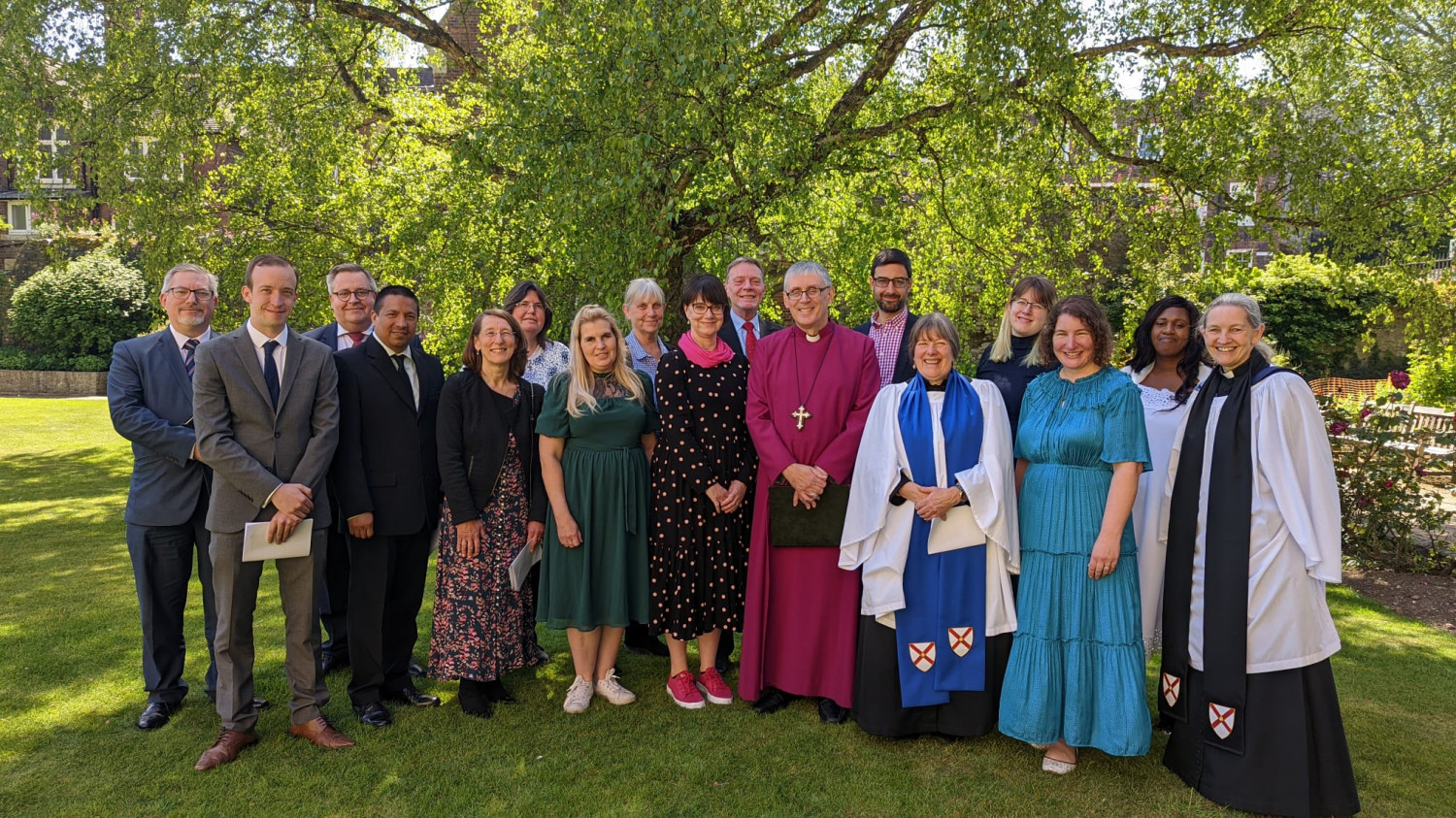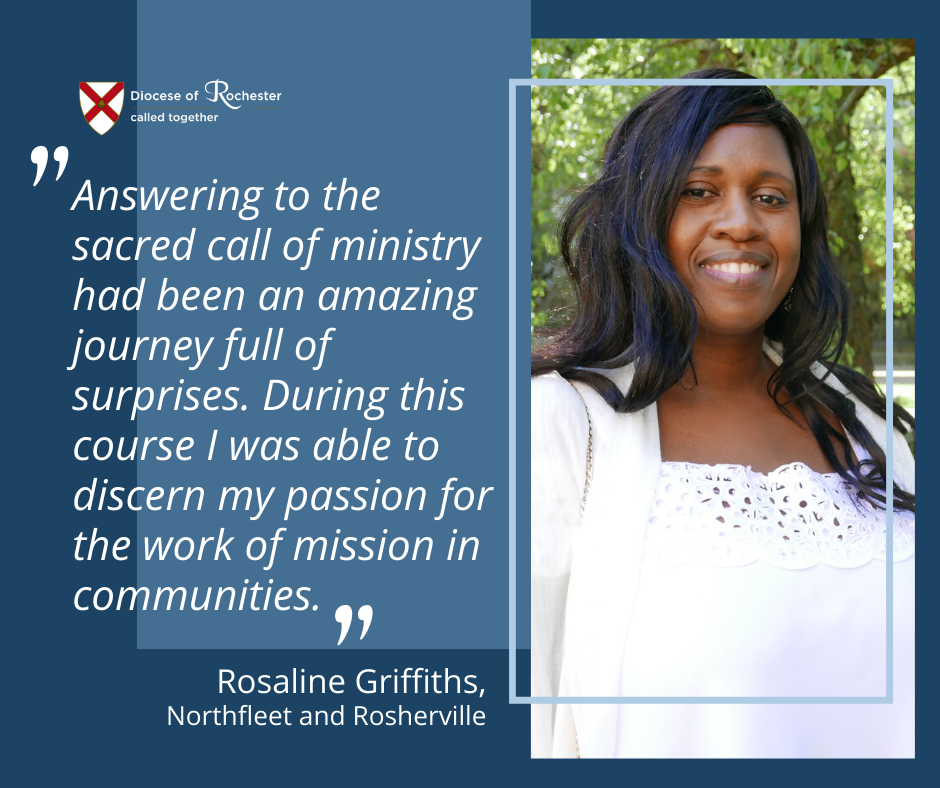
Saturday 14 May, was a day of great rejoicing, as 14 new Lay Ministers were licensed at Rochester Cathedral by Bishop Simon to serve 11 parishes across the Diocese of Rochester.
Warden of Lay Ministry, Karen Senior said: "After 2 years of Covid restricting the annual licensing service, it was great to see this year’s cohort in the Cathedral supported by families and friends from their parishes."
Licensed lay ministers are not ordained, but hold a leadership role in their parish. Many of those licensed at the weekend are in paid employment and see their working week as very much part of their ministry, just as much as their Sunday church service involvement.
While some of the new LLMs are employed in ministry roles, this year's cohort also includes teachers, a farmer, people newly retired, parents-to-be, and grandparents.
View a gallery of photos
The candidates all spoke of Saturday as being an important stage on the journey of following Jesus. For many of them, this was something they wouldn’t have imagined 5 years ago, so they are aware that in future, God may have other surprises in store for them in the church of the future.
Rosaline Griffiths, newly licensed LLM for Northfleet and Rosherville agreed:
“Answering to the sacred call of ministry had been an amazing journey full of surprises. During this course, I was able to discern my passion for the work of mission in communities"

For all of them, their journeys began with an Its Your Calling Day, and as they were licensed Bishop Simon said, 'receive authority', as he gave them their license. In his address, Bishop Simon said their ministry was to be a "witness to the resurrection...This is not just to affirm your belief in it, it is to draw people’s attention to the story itself."
Read Bishop Simon's address in full below or download a copy.
At the same time as the service, in a church in Orpington, another group of people were gathering with the Vocations Team at an It's Your Calling Day – so the congregation prayed for them, in whatever the Lord is calling them to.
Explore how God may be calling you. Visit our God's Plan for You pages
Read Bishop Simon's address below or download a copy
Across the world today, the Church is thinking about St Matthias, the substitute apostle. Unlike him, I assume you aren’t replacing Judas in your parish and you weren’t chosen by lots. Unless the Formation and Ministry team has been cutting corners recently, I’m guessing yours has been a more rigorous process.
Faced with the task of replacing Judas, the disciples prayed in words echoing Samuel’s choosing of David, where the deciding factor was the nature of the heart, not the appearance of the man. It is not just today that we are in danger of being deceived by superficial outward indicators like looks, height and voice. As God alone sifts the human heart, we need his guidance to make good judgments.
But what was that drawing lots things all about?
It feels a bit like a long interview process being decided by rock, paper, scissors. Many people think there was a pre-Pentecost ethic at play here. In other words, the Holy Spirit was yet to inhabit people, filling them with the knowledge of God’s will and purpose – so other methods were used.
The disciples clearly believed God would work through chance processes if they asked him to. And if we’re honest, this is often what we pray when life is uncertain. Most of us use the language of doors being opened or closed by God. Through the eyes of faith, a door opening is a work of God. Without the eyes of faith, it is seen as luck.
Sometimes we lack imagination when we read Bible stories. What has St Luke left out of his account of the choosing of Matthias? One possibility is that the disciples could not reach a consensus and so resorted to lots. This is also the only story told about the life of the disciples between the ascension of Jesus and the day of Pentecost. The disciples wanted to choose a new apostle who had witnessed the resurrection, but Luke’s special focus on it suggests the trauma of Judas’ demise had cast a huge, dark shadow over their time of waiting.
He had betrayed Jesus; they hadn’t seen it coming; he had taken his own life. It must have created residual mistrust in the friends of Jesus. Who else couldn’t be relied on? If Jesus had got Judas wrong, who else might be secretly walking on the dark side? The choosing of Matthias was a conscious attempt to put some things right; a catharsis to cope with the meaning of Judas.
As lay ministers, you may have the family likeness of the Anglican, but the stories you inhabit in each parish will vary greatly. There are always shadows to ministry, and we do well to be aware of them. You would be hard-pressed to find a story as awful as Judas’, but there will be moments in ministry when it feels like the darkness is overcoming the light, in spite of what it says at the start of John’s Gospel. These are the times that challenge us at the deepest levels of faith and emotion, often triggering memories that disable our responses.
So, perhaps one of the things we take from the upper room is that none of the disciples faced their trauma alone. They stayed together, prayed often and told honest stories about the last hours of Jesus. We are the body of Christ; we rejoice together, but we also suffer together. This is where our resilience is found.
The specific calling of Matthias was to be a witness to the resurrection. And it is yours as lay ministers, too. This is not just to affirm your belief in it, it is to draw people’s attention to the story itself. There are lots of trendy things said about ours being a post-modern world or a post-truth society, but the analysis adds up. We eat a stew of information whose ingredients include truth and lies, both of which people swallow without distinction. Simply believing something doesn’t make it true – and that includes the resurrection.
We should talk about the evidence for the resurrection, and the need for people to make a judgment on it. It is a defining fork in the road of human history. If it’s not true, it leads us down a dead end; if it is true, it leads us to eternal life. Is there any other event on which so much hangs? No wonder the disciples believed telling this story was their chief calling. And it is yours as ministers of the Gospel.
A second strand to your ministry is to help the people of your parish figure out how to live as followers of Jesus in everyday life. There is nothing new in this calling; it has existed since the start, when Jesus asked for disciples to be made to be made everywhere. We should never allow the roles we create in the Church to disable other people.
Lay ministry is not a way for others to contract out the task of living the Gospel. And as lay ministers you should never permit this. It is about using all you are, all God has gifted you, to enable others to become the people God is calling them to be. To see that worshipping Jesus is about the other 167 hours in the week we do not spend in church; to get a grip on what it means to present our bodies as a living sacrifice in the midst of daily routines.
There is no more pressing a challenge; no more exciting a task.
And one way we do this is to help some people figure out what to do when the route they plan in life no longer works. Matthais’ story has something to say about this. St Luke did not waste any time telling us how the two men – Matthias and Joseph – took the result of drawing lots. He had an understated writing style which spends little time on feelings.
But we know this from reading the rest of the New Testament: Joseph was not rejected just because Matthias was chosen. When doors close for us – in relationships, jobs, property, perhaps – God is not refusing us access to his goodness and grace. He is choosing another means to deliver it. Sometimes he is saving us from our own choices. The road ahead may look unsettling to the one we wanted, but if we were given control over everything that happens to us in life, most of us would simply choose route one: the shortest and easiest distance between two points. This is not usually an authentic way of following Jesus, as experience shows time and again.
The funny thing about the substitute Apostle is that neither the one chosen nor the one not chosen is mentioned again in the Bible. Instead, St Paul becomes much more influential than either, after his dramatic conversion. The future rarely pans out as we imagine. Most importantly, Joseph was not impeded by not being chosen. He had been with Jesus from the beginning, seen his resurrection and would shortly be filled with the Holy Spirit.
An everyday faith response to apparent rejection and failure is to open our lives afresh to God. Route one is a human preoccupation. God has more routes than this in his divine map. Sometimes the longer routes have the better scenery. And the safer arrival.